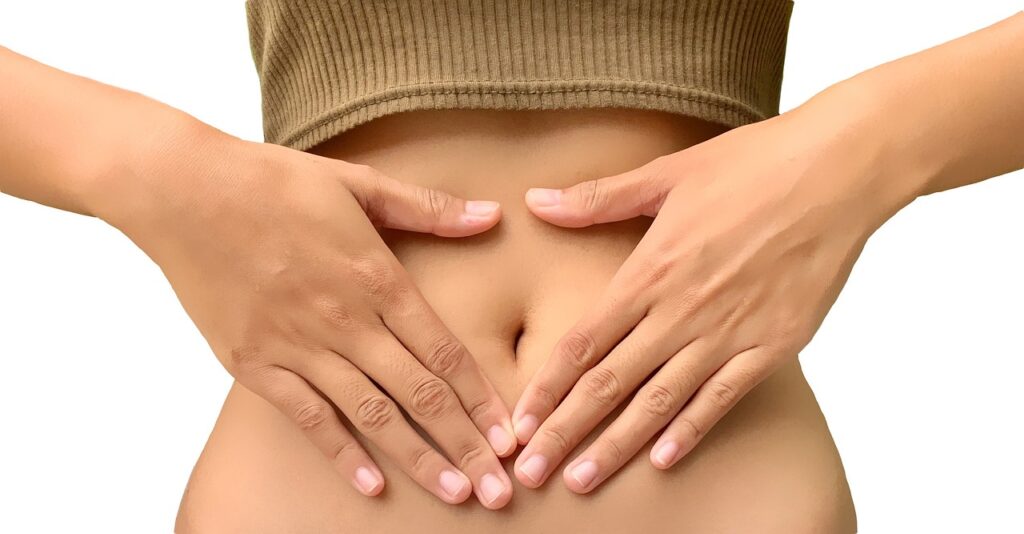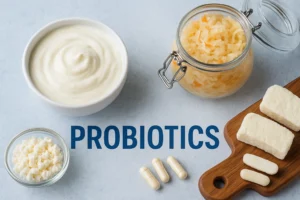
How Probiotics Help You Lose Weight? Here’s What Science Says:
When it comes to shedding extra pounds, most people think about hitting the gym, cutting calories, or going on a keto diet. But there’s another piece of the puzzle that’s getting a lot of attention lately: gut health—and specifically, probiotics. You may have heard that probiotics are good for digestion, but do probiotics help with weight loss?
Let’s explore how probiotics can support your weight loss journey, especially for women, and the best types to include in your routine.
Table of Contents
ToggleWhat Are Probiotics, Anyway?
Probiotics are live microorganisms, often called “good” or “friendly” bacteria, that naturally live in your gut. They help balance the gut microbiome, which is the community of bacteria and other microbes living in your digestive tract.
A healthy, balanced gut microbiome doesn’t just affect digestion—it also influences your immune system, hormone balance, mood, and yes, even your weight.

How Probiotics Can Help You Lose Weight
While probiotics aren’t magic pills for weight loss, research suggests they can support fat loss in several ways:
1. Probiotics Can Reduce Inflammation and Belly Fat
Chronic inflammation is linked to obesity and metabolic disorders. Some probiotic strains help reduce gut inflammation, which in turn may lower fat storage, particularly in the abdominal area. A balanced gut microbiome can also regulate fat absorption and reduce fat accumulation.
2. They Help Control Appetite and Cravings
Your gut bacteria communicate with your brain through the gut-brain axis, and they even play a role in producing appetite-regulating hormones like ghrelin (the hunger hormone) and leptin (the fullness hormone). Some studies show that probiotics may help you feel full longer, reduce hunger pangs, and lower cravings for sugary snacks.
3. They Improve Nutrient Absorption
When your digestive system is working efficiently, your body is better at absorbing nutrients like protein, vitamins, and minerals. This supports lean muscle maintenance and better metabolism, which are key to sustainable weight loss.
4. Probiotics May Influence Fat Metabolism
Certain strains can change the way your body stores and burns fat. For example, Lactobacillus gasseri has been linked to reductions in abdominal fat and body weight in some clinical studies.
Related: Probiotics in Bad Breath
Best Probiotic Strains for Weight Loss in Women
Not all probiotics are created equal. Different strains have different effects on the body. If you’re a woman trying to lose weight, you’ll want to look for strains that specifically support fat metabolism, digestive health, and hormonal balance.
Here are some of the most research-backed strains:
1. Lactobacillus gasseri
-
Found to reduce belly fat and waist circumference.
-
Helps suppress fat absorption in the intestine.
-
May improve metabolic function.
2. Lactobacillus rhamnosus
-
Shown to help women lose more weight when combined with a calorie-controlled diet.
-
Helps maintain gut balance during dieting, which can reduce bloating and discomfort.
3. Bifidobacterium lactis
-
Supports healthy digestion and improves gut motility (helps prevent constipation).
-
May reduce inflammation and support immune health, which is often taxed during dieting.
4. Lactobacillus plantarum
-
Reduces inflammation and supports gut lining integrity (which can prevent leaky gut).
-
Helps balance estrogen, which is especially important for women dealing with hormone-related weight issues.
5. Bifidobacterium breve
-
Involved in fat metabolism and may help prevent weight gain.
-
Can support skin health too—a bonus!
Tips for Getting the Most from Probiotics
If you’re considering adding probiotics to your daily routine, here’s how to make the most of them:
-
Choose multi-strain supplements that include the strains listed above.
-
Look for a product with at least 10 billion CFUs (colony-forming units) for noticeable results.
-
Take them daily and consistently—it takes time to rebalance the gut.
-
Pair probiotics with prebiotics, which are fibers that feed your good bacteria. Think bananas, onions, garlic, asparagus, and oats.
-
Consider fermented foods like yogurt, kefir, kimchi, and sauerkraut as natural probiotic sources.
Are There Any Side Effects?
Probiotics are generally safe for most people. You might experience mild bloating or gas in the first few days as your gut adjusts. These symptoms usually fade quickly. However, if you have a compromised immune system or a serious health condition, consult your doctor before starting any probiotic supplement.
Final Thoughts: Do Probiotics Help With Weight Loss?
Yes—probiotics do help with weight loss, especially when combined with a balanced diet, regular exercise, and healthy lifestyle choices. They work by improving your gut health, which in turn supports fat metabolism, appetite regulation, and digestion.
While they’re not a “magic bullet,” incorporating the right probiotic strains—especially those proven to help with weight management in women—can give your weight loss journey a powerful, science-backed boost.
So go ahead and show your gut some love—it just might thank you with a healthier body and a slimmer waistline.
P.S. Looking for a high-quality probiotic to support your goals? Keep an eye out for supplements that combine Lactobacillus gasseri, L. rhamnosus, and Bifidobacterium strains for the best results. And always read labels carefully to ensure you’re getting live, active cultures.
